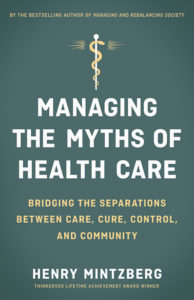 I have read dozens of books on healthcare. Not medicine (of which I have read voluminously), but healthcare. The delivery of medical services. I wanted to share a review of a book I recently finished that I must say has been the best of the lot. I’m one of those odd docs that enjoys discussing the delivery of healthcare as much as the art, practice, and science of medicine.
I have read dozens of books on healthcare. Not medicine (of which I have read voluminously), but healthcare. The delivery of medical services. I wanted to share a review of a book I recently finished that I must say has been the best of the lot. I’m one of those odd docs that enjoys discussing the delivery of healthcare as much as the art, practice, and science of medicine.
To better understand and contribute to both of these fields along the way I got my MBA (for better or worse) in addition to my MD degree. There are two distinct languages related to each discipline with some very clear differences in approach to solving problems and execution. Physicians are taught to act autonomously, be decisive and take personal responsibility for their actions. Managers are taught to make decisions in groups, often by consensus, and tend to only act independently in a crisis or when absolutely necessary. So you can imagine when these two groups try to work together the physicians view the managers as slow and indecisive while the managers often view the physicians as gun slingers who tend to “shoot from the hip”. No wonder there are often disagreements as healthcare organizations try to navigate their operations and set strategy. Most every book I have read focuses on bringing business discipline to healthcare leaning on all the academic business practices including strategy, quality practices, operational efficiencies, leadership principles, data management, economies of scale and administrative engineering. They also tend to look at categories of care focusing on solutions that involve centralization, specialization, categorization and integration.
In Dr. Henry Mintzberg’s book entitled: MANAGING THE MYTHS OF HEALTHCARE – Bridging the Separation Between Care, Cure, Control and Community I found some of the most authentic, balanced discussion of the challenges facing healthcare today. I highly recommend it to anyone interested in the complexities of delivering compassionate, high quality healthcare to those who need it, whether in a market based system as in the United States or a centralized system as in Canada. He does a very nice job of discussing the challenges faced by patients, providers, managers, institutions and governments. Each stakeholder with her own goals, perspectives and priorities that are often misaligned with each other.
He begins by sharing what he feels are the top 9 Myths in understanding healthcare today. In summary they are :
- We have a “system” of healthcare. He argues we have a collection of disease cures rather than a system for creating, fostering and promoting health
- Our Healthcare System is Failing. He points out we are exceptional at treating sickness, better than ever in fact. Our collection of cures has been extremely successful.
- The Healthcare System and Institutions can be fixed with “heroic leadership”. Mintzberg is an expert in Management and makes it clear that Leadership without management is ineffective and the intrinsic clash between providers (execution) and administrators (strategy) leads to an unhealthy culture and poor collaboration.
- The Healthcare System can be fixed with more “Administrative Engineering”. Bringing in more MBA’s, analysts, consultants, or collecting more data, and re-engineering processes will not fix healthcare. He argues most innovation and change needs to come from the ground up, not from the top down. He also uniquely discusses how the quest for “scale” or bigger, more centralized or efficient systems, may in many cases not translate well to healthcare
- The healthcare system can be fixed by more commodifying, categorizing and calculation. He points out that categorizing disease is fraught with problems and inaccuracies and that the holy grail of “evidence based medicine” should better be called “evidence guided medicine”. A very insightful distinction that leaves room for judgement.
- The healthcare system can be fixed by more competition. He points out how many other management gurus (notably Michael Porter) see the right kind of competition as the answer to solving the healthcare puzzle but that by itself competition can neither foster innovation or consistantly reduce costs. A very well discussed contrarian viewpoint.
- Healthcare Organizations can be Fixed by Managing them more like Businesses. This one really flies in the face of most conventional thinking. He insightfully describes medicine as a “calling” for both physicians and managers and that if properly aligned, this culture can create a more compassionate, effective system. He believes that patients are not “markets” and medical care is not a “product” that people consume.
- Medical Care is Rightly Left to the Private Sector.
- Medical Care is Rightly Left to the Public Sector. As a Canadian he does a nice job contrasting the two viewpoints and, of course, concludes that there is a middle position that a “Plural” solution, where the two sectors cooperate and collaborate to create a vibrant healthcare solution.
Following a discussion of these “Myths” he does a wonderful job of exploring how he sees Organizing and Re-Framing Healthcare into a new paradigm of Strategy, Ownership, Management, Operation and Delivery. While he stops short of presenting a fully orbed solution set, he lays out some very thoughtful, innovative and novel ideas for how to optimize the delivery and consumption of medical services. If you are interested in some of the best thinking in healthcare management I highly recommend you read this book. As a convenience I have placed it into my bookstore, but it is widely available.